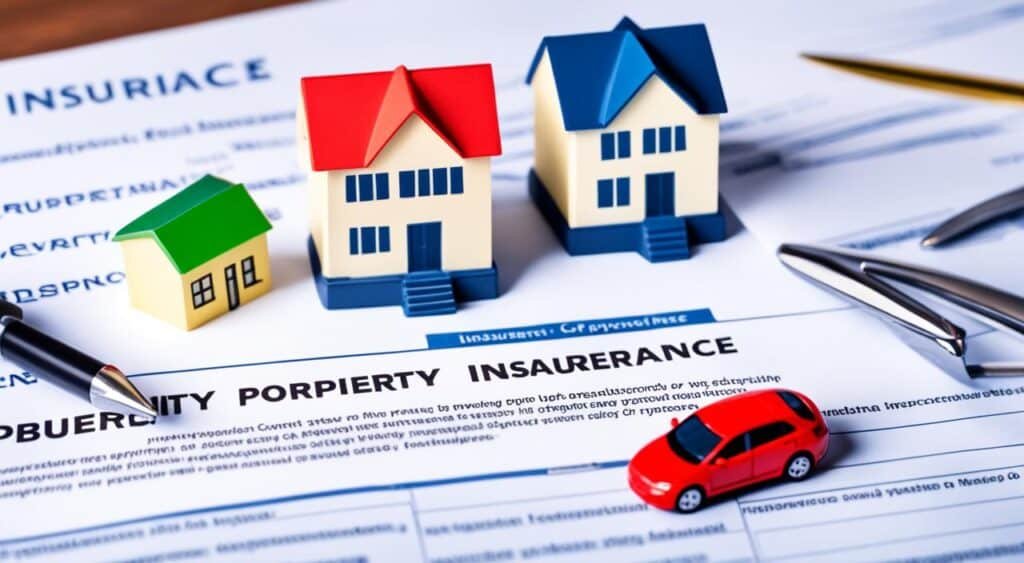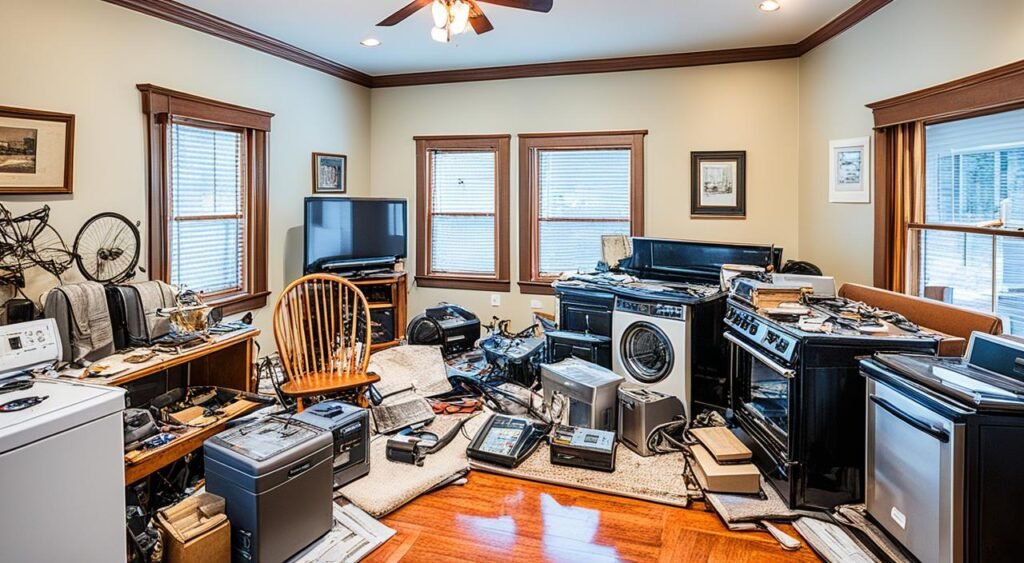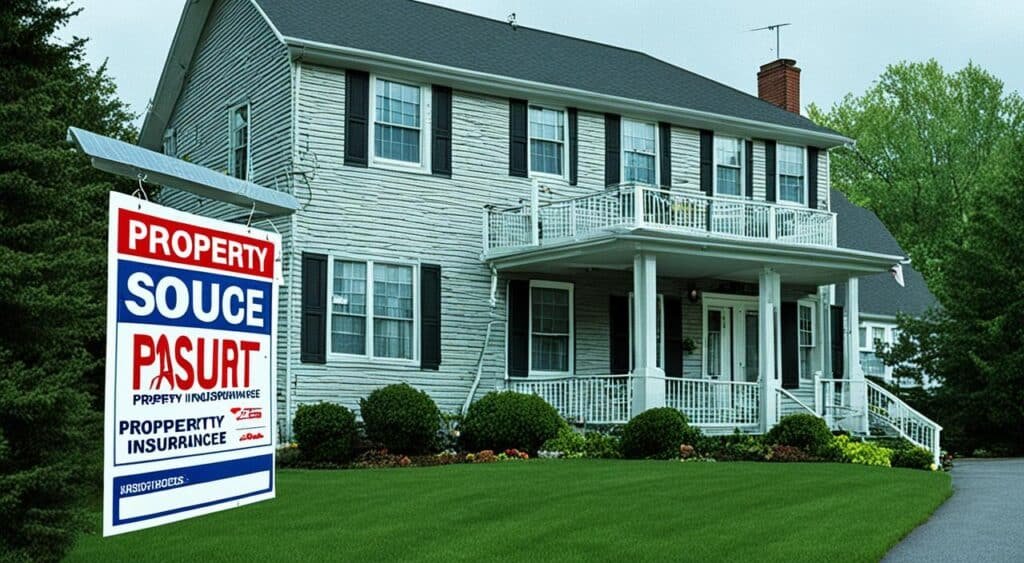Property insurance covers various policies for property owners. It offers financial help for damages or theft. It also protects those who get hurt on the property. Common types of this insurance are homeowners, renters, flood, and earthquake insurance.
Home and renters insurance usually cover personal items. But for expensive items, extra coverage might be needed. If damage happens, the insurance will pay the cost to repair or replace the belongings.
Key Takeaways
- Property insurance offers financial help for owners and renters after damage or theft.
- It includes coverage like homeowners, renters, flood, and earthquake insurance.
- Most of your belongings are protected by your home or renters policy. But costly items could need extra coverage.
- If you file a claim, the insurance will pay for repair or replacement costs.
- It can also cover you if someone gets hurt on the property. This applies to people not living or owning the property too.
Understanding Property Insurance
Property insurance is key for securing finances against sudden events. It covers various properties, like homes and business places. Knowing the property insurance definition and types is vital for smart coverage choices.
Definition and Key Takeaways
Property insurance offers safety for property against damage, theft, and liability. It includes homeowners, renters, flood, and earthquake insurance. The main coverage types are replacement cost and actual cash value.
Types of Property Insurance Policies
- Homeowners insurance: Protects home structures, belongings, and liability for accidents.
- Renters insurance: Covers tenants’ belongings and provides liability protection.
- Flood insurance: For flooding damage, not usually in standard policies.
- Earthquake insurance: Covers earthquakes, also not in regular policies.
These policies protect against various dangers like fire, wind, hail, and theft.
“Property insurance is vital for protecting against unexpected financial losses.”
Knowing about property insurance and its types helps people and companies choose the best coverage. This ensures their valuable items are protected.
What Does Property Insurance Cover?

Property insurance helps homeowners and businesses in times of trouble. It shields them from the costs of unforeseen accidents. Though each policy varies, many include protection against common dangers.
Perils Covered by Property Insurance
Property insurance coverage shields you from various harms. It guards against:
- Fire and smoke
- Wind and hail
- Lightning strikes
- Vandalism and theft
- Damage from falling objects, like trees or debris
Moreover, it can offer liability insurance. This helps if someone gets hurt on your property. It takes care of legal costs and any compensation they might receive.
Exclusions from Coverage
Despite its many benefits, property insurance doesn’t cover everything. Certain perils not covered by property insurance include:
- Floods and water damage from sources like sewer backups or flooded ground
- Earthquakes and other natural disasters
- Mold and fungus growth
- War, terrorism, and nuclear events
It’s key for property owners to know exactly what their policy protects against. They should look closely to see what’s not included too. For some dangers, additional coverage might be an option.
“Property insurance is key for keeping your home or business safe. Knowing about the perils covered by property insurance and what’s excluded lets you choose wisely.”
Types of Property Insurance Coverage

Property insurance offers three main types of coverage. These are replacement cost, actual cash value, and extended replacement costs. Knowing the differences is key to getting the best protection for your property.
Replacement Cost Coverage
This type pays for fixing or replacing your damaged property at its current value. It doesn’t consider depreciation. Homeowners often choose this to fully restore their property after a loss.
Actual Cash Value Coverage
In contrast, actual cash value considers depreciation when paying for repairs. It might be cheaper but requires more payment from the policyholder during a claim.
Extended Replacement Cost Coverage
Extended replacement cost pays more than your policy’s limit if rebuilding costs have gone up. It’s good when construction prices have increased a lot since you bought your policy.
| Coverage Type | Description | Advantages | Disadvantages |
|---|---|---|---|
| Replacement Cost | Pays the full cost to repair or replace damaged property without deducting for depreciation. | Ensures property is fully restored to its original condition. | Generally more expensive than other coverage types. |
| Actual Cash Value | Pays the replacement cost minus depreciation. | Less expensive than replacement cost coverage. | Policyholders may have higher out-of-pocket expenses in the event of a claim. |
| Extended Replacement Cost | Pays more than the policy’s coverage limit if construction costs have increased, up to 25% above the limit. | Provides additional coverage in the event of rising construction costs. | May be more expensive than standard replacement cost coverage. |
Knowing the different types of property insurance coverage lets you choose wisely for your needs and budget.
Special Considerations

When you think about homeowners insurance policies, there’s more than basic coverage. Knowing about the different types of homeowners insurance is key. It lets homeowners make sure they’re protected just right.
Common Homeowners Policies
The top homeowners insurance policies you’ll hear about are:
- HO3 Policy – Covers loss or damage from 16 perils, like fire, theft, and some natural disasters.
- HO5 Policy – An “open peril” policy that goes beyond HO3, focusing on the home’s structure and its contents.
These are just a few types of homeowners insurance. It’s important for homeowners to look at what they need. Then, pick the best coverage to protect their home and its contents.
| Policy Type | Key Features |
|---|---|
| HO3 Policy | Covers 16 specific perils, including fire, theft, and certain natural disasters |
| HO5 Policy | Provides “open peril” coverage for the home’s structure and contents |
“Selecting the right homeowners insurance policies is crucial for protecting your biggest investment – your home.”
Property Insurance vs. Homeowners Insurance

It’s key to know the differences between property insurance and homeowners insurance for protecting your valuable assets. They seem similar but have unique benefits, covering different risks.
Property insurance includes many policies for assets like homes, commercial buildings, or investment properties. It covers natural disasters like floods or man-made like fires. Homeowners insurance specifically shields your main home and what’s inside.
| Property Insurance | Homeowners Insurance |
|---|---|
| Covers a wide range of property types, including homes, commercial buildings, and investment properties | Primarily focuses on protecting your primary residence and personal belongings |
| Provides coverage for a variety of natural disasters and man-made perils | Typically covers damage from fires, theft, and certain natural disasters like storms and hail |
| May include specialized coverage for specific risks, such as floods or earthquakes | Often includes liability coverage for accidents or injuries that occur on your property |
The main difference between the two is coverage range. Property insurance is broader, shielding various assets and risks. Homeowners insurance is more specific, aimed at your living space and personal items. Knowing these differences helps choose the right protection for your assets.
“The right insurance coverage can make all the difference in the event of a disaster or unexpected event. It’s essential to understand the differences between property and homeowners insurance to ensure you have the protection you need.”
What Property Insurance Doesn’t Cover
Property insurance helps protect your home or business. But, it’s key to know what it doesn’t cover. Many are surprised by what their policy won’t pay for. This knowledge helps in making wise coverage choices and prevents unexpected costs.
Most policies won’t cover damage from a home’s age or wear and tear. This includes issues like a leaking roof or cracks in the foundation. Property insurance doesn’t usually help with insect damage or mold, unless caused by a covered issue.
- Damage from a home’s age or normal wear and tear
- Damage from insect infestations or mold growth (unless directly caused by a covered peril)
- Damage from floods, earthquakes, and other natural disasters
- Damage from drain or sewer backups, seeping groundwater, and other water sources
Natural disasters are often not covered. This includes floods, earthquakes, and tsunamis. You need special policies for such cases. Also, damage from things like sewer backups and standing water is typically not included in basic coverage.
| Exclusion | Example |
|---|---|
| Wear and Tear | A leaky roof or cracked foundation |
| Mold and Insects | Termite damage or black mold growth |
| Natural Disasters | Flood, earthquake, or tsunami damage |
| Water Damage | Drain or sewer backups, seeping groundwater |
Knowing what property insurance doesn’t cover is crucial. It allows you to fill in those gaps. This might mean buying more insurance or using other ways to manage risks. Being aware of your policy’s limits helps protect your property better.
Categories Covered Under Homeowners Insurance

Your homeowners insurance policy protects your home and your stuff. It covers many important areas. These include your house’s structure, your personal belongings, and even legal matters.
- Dwelling Coverage: It protects your home’s physical structure against damage. This could be from fire, wind, hail, or theft.
- Personal Property Coverage: It covers your belongings if they’re lost or damaged. This might include your furniture, electronics, or clothes.
- Liability Coverage: If someone gets hurt at your place, this part helps with their medical bills. It also covers you if you accidentally damage someone else’s property.
- Additional Living Expenses: If your house is unlivable due to damage, this helps with the cost of living elsewhere until it’s fixed.
Policy details and limits can change based on what you choose. So, always read over your policy’s terms. Make sure you know what’s covered and what’s not.
| Coverage Type | What It Covers |
|---|---|
| Dwelling Coverage | Damage to your home’s physical structure is included in this. It covers the roof, walls, and foundation against certain risks. |
| Personal Property Coverage | It handles losses like theft or damage to your personal belongings. These can range from electronics to clothes. |
| Liability Coverage | It helps with costs if someone gets hurt on your property. It also assists if you cause damage to someone else’s property. |
| Additional Living Expenses | The policy also pays for higher living costs if you can’t stay at home. This is while your place is being fixed because of certain covered events. |
Always remember, the details in your policy can differ. It’s key to look closely at your policy. Understand what it covers and doesn’t.
“A homeowners insurance policy is a comprehensive protection plan that safeguards your most valuable asset – your home.”
Documenting and Safeguarding Your Property

Keeping a detailed list of what you own is key, especially in emergencies. This list can speed up insurance claims and help with tax deductions for lost items. Take photos or videos of your stuff. For high-value items, it’s smart to get them appraised.
Inventory Your Home or Business
It’s crucial to make a full list of everything in your home or business. This will really help if a disaster strikes. It makes claiming insurance easier and ensures fair compensation. To do this, follow the steps below:
- Photograph or video each room, capturing the contents in detail.
- Make a list of valuable items, including their make, model, serial number, and estimated value.
- Retain appraisal documents for high-value items, such as jewelry or art.
- Store your inventory in a secure, waterproof location, such as a safe or bank deposit box.
Store Vital Records Safely
It’s vital to keep important documents safe. Store paper copies in a fireproof and waterproof spot. This includes birth certificates, Social Security cards, and insurance papers. Share these with someone you trust for extra safety.
Keep electronic copies on a flash drive or external hard drive. Protect them with strong passwords. Then, store these in your safe spot. This protects your documents from fire or water damage.
“Documenting your property and safeguarding important documents is a critical step in protecting your assets and ensuring a smooth claims process in the event of a disaster.”
Understanding Policy Coverage
When we talk about property insurance, knowing what different policies cover is key. We will look at what homeowners, renters, and business insurance usually include.
Homeowners Policy Coverage
A typical homeowners policy covers your home, other structures on your land, and personal items. It also includes loss of use, personal liability, and medical payments. Specialized policies are available if you live in a manufactured home, condo, or on a farm.
Renters Policy Coverage
Renters insurance helps protect your belongings, covers temporary living costs if your place becomes unlivable, and offers liability coverage. If you rent, your landlord or management might ask you to have it.
Business Policy Coverage
Business insurance shields your company’s physical assets, employees, and against loss of income due to interruptions. It usually covers property, liability, and income losses. Your business might also need more specific insurances for its vehicles, workers, cyber risks, etc.
Knowing what your insurance covers is vital for your home, rental, or business.
| Coverage Type | Homeowners Policy | Renters Policy | Business Policy |
|---|---|---|---|
| Dwelling/Building | ✓ | – | ✓ |
| Personal Property | ✓ | ✓ | ✓ |
| Loss of Use | ✓ | ✓ | ✓ |
| Personal Liability | ✓ | ✓ | ✓ |
| Business Interruption | – | – | ✓ |
Property Insurance
Property insurance covers different policies that help keep individuals and businesses safe from big money losses. Homeowners, renters, and flood insurance fall under this category. The main goal of property insurance is to give money back for lost personal items or if buildings get damaged. It also helps with any legal trouble that might happen on the property.
For example, homeowners insurance protects your place and what’s inside from things like fire or theft. Renters insurance does the same but for people who live in places they don’t own. It guards against common dangers. Flood insurance is for when water damage happens, something usually not covered by regular plans.
The details of property insurance changes with each plan and the choices you make. Some plans offer more, like extra legal protection. Knowing what each plan offers is key to making sure you’re fully covered.
Key Features of Property Insurance
- Compensation for personal belongings and physical damage to structures
- Liability coverage for property owners and renters
- Protection against perils like fire, theft, and natural disasters
- Specialized policies for unique risks, such as flood insurance
- Potential for additional protections, such as liability coverage
Understanding the wide range of property insurance and available policies helps people and businesses protect what matters most. It allows for smart choices to manage money risks.
Settlement Options for Property Claims
When you file a property insurance claim, there are different ways you can get paid. Homeowners and renters should know these choices can affect how much money they get and how easy the process is. Let’s look at the main types of settlement options:
Replacement Cost
Replacement cost insurance pays to replace or rebuild things at today’s costs. It’s the most complete because it helps you get everything back as it was. Some plans have “guaranteed” or “extended” replacement cost. This helps cover any jump in prices after a big disaster.
If you want to stay up to date with building codes, you can buy extra coverage for that too.
Functional Replacement Cost or Market Value
Functional replacement cost or market value insurance fixes things with new materials to match what was lost. If something can’t be repaired, the amount paid is what the property was worth, not to rebuild it from scratch.
Actual Cash Value
Actual cash value insurance gives you the cost of an item today, minus its age-related depreciation. For example, if a ten-year-old item got damaged, you’d get what a ten-year-old item is worth, and not a new one. This type of coverage is cheaper but pays less in claims.
Knowing the choices is key to picking the best insurance policy for your situation and budget. Look closely at what each plan offers. This way, you can make sure you’re covered the way you want if something bad happens.
Also Read: Home Insurance Guide: Unique Challenges and Solutions While Insuring Your Tiny Home
Conclusion
Property insurance is a crucial guard for both people and companies. It keeps their valuable items safe from various dangers. By knowing the kinds of property insurance and what they cover, you can pick the right one. This will protect your investments and keep you financially secure.
There are many types of property insurance, from what homeowners and renters need to what businesses might use. You can protect your personal items, the buildings you own, or yourself from being sued. The most important thing is to look at all the choices and choose what fits your needs best.
Having property insurance means much more than just avoiding big bills when accidents happen. It’s about feeling calm and ready to reach for your dreams. Be smart and do your homework. This way, you can get the right property insurance without any stress. Then, you can focus on your future, knowing your things are safe.
FAQs
What is property insurance and what types of property can be insured?
Property insurance covers a wide range of policies for property owners. This can be homeowners insurance, renters insurance, and more. It protects a property’s structure, its contents, and the owner’s liability.
What are the key takeaways about property insurance?
The main points about property insurance are its different types. It can cover homeowners, renters, floods, and earthquakes. It focuses on three main types of coverage: replacement cost, actual value, and extended replacement.
What types of property insurance policies are available?
There are several property insurance options such as for homeowners and renters. Other forms include flood and earthquake insurance. They guard against many threats like fire, wind, and theft.
What perils are typically covered by property insurance?
Property insurance often helps with weather issues like fire and wind. It handles problems caused by hail, snow, and lightning too. Also, it includes vandalism and theft, safeguarding both the space and its contents.
What are the common exclusions from property insurance coverage?
Many often excluded damages are from tsunamis, floods, and mold. Policies typically don’t cover earthquake harm or extreme exceptions like war. They also usually avoid events with nuclear origins.
What are the main types of property insurance coverage?
The main types are replacement cost, actual cash value, and extended replacement. Replacement cost handles repairs at current values. Actual cash value considers depreciation. Extended replacement may pay more for construction costs increased.
What are the most common types of homeowners insurance policies?
HO3 and HO5 are popular types. HO3 covers 16 dangers while HO5 offers a broader defense for the property and its contents.
How do homeowners insurance and property insurance differ?
Different names for umbrella policies bind them. Homeowners insurance falls under property insurance. It focuses on damages and personal losses like floods and storms. Meanwhile, property insurance involves various policy types, including flood and earthquake protection.
What types of property damage are typically not covered by property insurance?
Property insurance usually doesn’t cover age or wear from use. Mold and insect damage may not be covered too. Many water-related harms, like floods and sewer issues, are often excluded.
What does a standard homeowners insurance policy cover?
A typical policy protects the home’s structure, personal items, and includes liability coverage. It pays for damages from hazards, personal losses, medical costs, and living elsewhere during repairs.
How should you document your property for insurance purposes?
Keep an inventory of your belongings. Photos or videos help. For valuable items, consider an appraisal. This speeds up claims and could help with tax deductions for losses.
How should you store vital records for your property?
Store paper records in safe, waterproof places. Keep electronic copies safe with strong passwords. Sharing copies with others ensures they are safe in an emergency too.
What types of property insurance policies are available for different types of residences?
Home, condo, and farm residences have unique insurance options. They cover dwellings, liability, and more. They also offer coverage for personal property and medical needs.
What does a renters insurance policy typically cover?
Renters’ insurance protects personal property and liability. It usually is required by landlords to cover certain damages or losses.
What types of coverage should a business owner consider for their property?
Business owners should consider property, liability, and business interruption insurance. They may also need specific insurance for vehicles, workers, cyber liability, floods, and terrorism. An insurance expert can help customize the policy.
What are the main settlement options for property insurance claims?
The main options are replacement cost, functional replacement, and actual value. Replacement cost pays to rebuild or replace. Functional/market value provides for equivalent repairs. Actual cash value deducts depreciation from the replacement cost.





